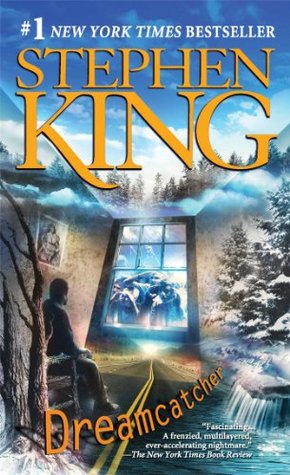More on this book
Community
Kindle Notes & Highlights
Down there he is one, all alone, and what a strange one he is. God has hurt him and blessed him at the same time,
He sees the line and now we see it, too. And although we may perceive it in different ways, part of us will always see the line. We’ll see it until the day we die.
Jonesy thinks: It’s not how they really are, it’s just the way we see them.
He walked slowly back to the door, reminding himself to be wary . . . because, as Gollum had said of Bilbo Baggins, it was tricksy, precious, aye, very tricksy.
TO THOSE LOST IN THE STORM MAY 31, 1985 AND TO THE CHILDREN ALL THE CHILDREN LOVE FROM BILL, BEN, BEV, EDDIE, RICHIE, STAN, MIKE THE LOSERS’ CLUB Spray-painted across it in jagged red letters, also perfectly visible in the truck’s headlights, was this further message:
The years of 1984 and ’85 were bad ones in Derry. In the summer of 1984, three local teenagers had thrown a gay man into the Canal, killing him. In the ten months which followed, half a dozen children had been murdered, apparently by a psychotic who sometimes masqueraded as a clown.
“Pete saw it, he saw the line,” Henry murmured.
He felt a hundred years old until he took his first step toward the dirty window, then decided it was more like a hundred and ten.
Dreamless since childhood and thus unsane, Kurtz woke as he always did: at one moment nowhere, at the next completely awake and cognizant of his surroundings.
As I was going up the stair I met a man who wasn’t there; He wasn’t there again today! I wish, I wish he’d stay away.
It was a creepy sound, like a ghost trying to remember how to be human.
Mr. Gray didn’t know what taste was. How could he? When you cut to the chase, he was nothing but a mushroom with a high IQ.
Maybe sort of horrible. The cry of a new-made vampire.
Jonesy didn’t think Henry had left the building just yet. It was even possible that Henry had an encore in mind.
Henry is surprised again and again by how the children he grew up with (including himself) have disappeared
Instead he reflects on how odd Derry is about missing children—not like other towns at all.
The key word is buried. Lots of things are buried in Derry. Talk of missing children, for instance.
Because Duddits sees the line.
He has been waiting for them, and although his smile is as sunny as ever, his eyes are serious. Eh ee own? Duddits asks—Where we goin?
Duddits shines brightest. He is their ball; without him there is no bounce, there is no play.
“Ooo you eee-a yine, Eete?” Duddits inquires in a fatherly way that almost makes Henry laugh—Do you see the line, Pete?
There is an ancient and incredibly complex system of drains and sewers beneath Derry, a town which exists in what was once swampland shunned even by the Micmac Indians who lived all around it.
It was one thing to know intellectually that things had gone tits-up; it was another when the truth landed in your gut like a heavy sack of meal.
Mr. Gray had discovered murder.
The moving finger writes; and having writ, moves on.
The rules have changed, my friend. They stopped for Duddits, and Duddits sees the line.
For some, of course, this was impossible. For some, home had been cancelled.
She wants someone to know who passed this way, and there is something hideously, unassuageably sad about that.
Pride was the belt you could use to hold up your pants even after your pants were gone.
That there was light as well as darkness.
But he will not stay away. He is crafty old Mr. Death, and he will not stay away. He has business here.
Some dreams die and fall free, that is another of the world’s bitter truths. How many bitter truths there are.
I am the eggman, he thinks. Time slowed, reality bent, on and on the eggman went.
What’s in my head isn’t quite a memory, not that, but a true ghost in the machine.
Mr. Gray is the ghost in the machine, the ghost on life support, and the life support is him.
The body is either stupid or infinitely wise, but in either case it is spared the terrible witchery of thought; it only knows how to stand its ground and fight until it can fight no more.
The byrum’s last Jonesy-tinged thought was I should have taken him up on it. I should have gone na—


